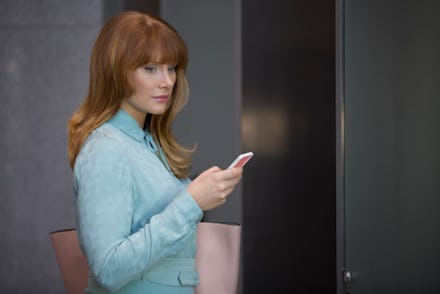'Black Mirror' season 3: "Nosedive" features a human-rating app that's shockingly real

Many of the technologies on Black Mirror — from a recording device that plays back your memories at will to a credits system that rules a society — are too unbelievable to imagine. The first episode of season three, "Nosedive," features such tech: a people-rating app that dominates social life. Users are known and sorted by how many stars (out of five) they have on the app; the caste system awards greater privileges to those at the top of the heap.
Lacie (Bryce Dallas Howard) is invested in rising to the top, with the promise of a better life just a couple tenths of a point away. She sees being the maid of honor at her wealthy childhood friend Naomi's wedding as her chance to curry favor with "high-fours" — those ranked 4.5-plus stars — and finally achieve her dreams. But she gets lost in the hunt, nearly losing herself in the process.
Does the app sound unbelievable? It shouldn't; after all, at one point within the last year, it was perilously close to becoming reality.
(Editor's note: Spoilers ahead for the first episode of Black Mirror season three.)
In September 2015, Julia Cordray and Nicole McCullough announced the impending release of a new app that shocked the tech world. Said app, Peeple, was labeled "Yelp for people" because of its remarkably simple function: Rate other people on a scale from one to five stars. (Sound familiar?) Initially, there was no way to opt out of being ranked — any person's average rating would be available to users of the app to see.
The app quickly became mired in controversy, both for its boundary-free premise and Cordray and McCullough's thin skin when it came to criticism. After a few days of weathering the storm, the creators agreed to rethink the app and push back the November projected release date.
When the app finally did come out, in March of 2016, it was defanged: All write-ups on Peeple had to be approved by the person being reviewed. Naturally, few users would be interested in publishing negative feedback about themselves, leaving Peeple a shell of an app that died on the vine — with brutal reviews to match.
Peeple failed because potential users bristled at the app's core premise — but what if they hadn't? What if people reacted positively to the idea, slowly ingraining it into their own lives? What if a familiar technology, like Facebook, were to introduce a feature for rating other users? Would people remain resistant? Or would it become all the easier to swallow?
That's what makes "Nosedive" so disturbing: It feels just a step or two removed from our reality. After all, we rate our Uber drivers from one to five stars — and they rate us, too. Lacie's thirst for validation from the wealthy elite mirrors the desperate hope that our Instagram crushes, romantic or platonic, will double-tap our photos. Peeple may have been rejected, but the concepts that made it up are part of everyday life.
The moral of "Nosedive" is, in essence, "The truth will set you free." Upon the advice of a woman named Susan (rated 1.4 stars), who stopped caring about the system and started being brutally honest, Lacie gives a deranged maid of honor speech full of truth bombs about Naomi. Her honesty drops her rating below one star, which gets her locked up and removed from the app. Finally free of the system, Lacie seems happier — even though she's imprisoned.
Lacie's story isn't hard to believe. While "Nosedive" has been called a satire of social media, such a description feels shallow. The episode isn't deriding our current state of life online; it's a cautionary tale of how close our world is to becoming Lacie's. It's a horror story about a world where Peeple not only caught on, but became society's dominant form of social interaction. Such a story would be hilarious if it weren't so terrifying.